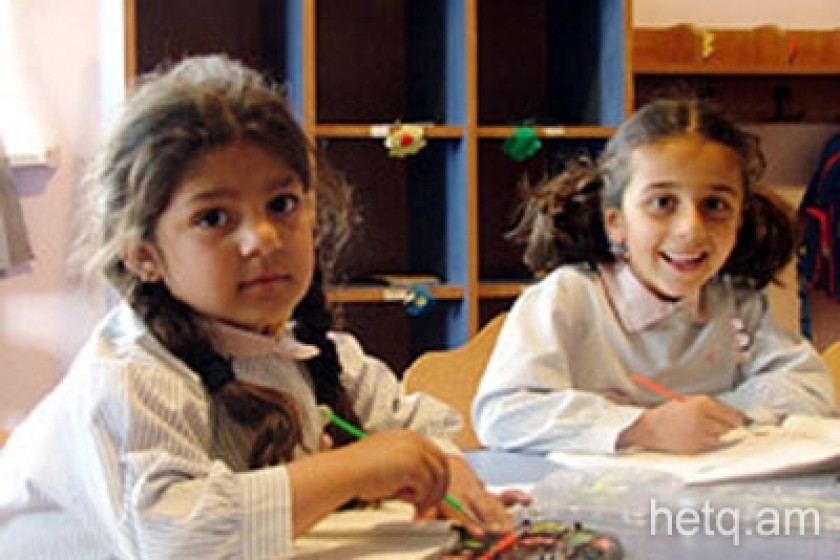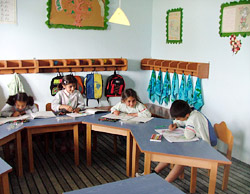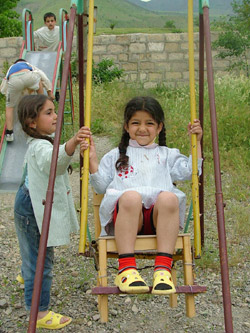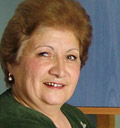
The Arakel Village Kindergarten May Be Closed
Sisters Ruzanna and Eleonora go to elementary school. Ruzanna says school is very boring, but they like to come to kindergarten after school. “Sometimes we skip classes and come here,” she whispered.
The Boghboch (Bud) Kindergarten is a second home for the sisters and many other children, and for their parents, too, who often visit this children's world to escape their everyday concerns.
The kindergarten is especially important in this village of 142 people, where life passes slowly and children have little to do but run after cattle and wander along the streets. The kindergarten catches the eye from afar, with bright flowers on the windows, replaced by yellow and red leaves in autumn and white snowflakes in winter. The children work with their teachers to decorate it, inside and outside.
 Children come to Boghboch from 9:00 to 1:00 each day. At 11:00 they have tea and cookies. There are two rooms—blue and pink—for the younger and older groups. The children study Armenian and elementary mathematics. They have an alphabet pageant at the end of the school year, and celebrate different holidays all year long, making the decorations themselves. They do arts and crafts, and have planted a garden with sixteen fruit trees.
Children come to Boghboch from 9:00 to 1:00 each day. At 11:00 they have tea and cookies. There are two rooms—blue and pink—for the younger and older groups. The children study Armenian and elementary mathematics. They have an alphabet pageant at the end of the school year, and celebrate different holidays all year long, making the decorations themselves. They do arts and crafts, and have planted a garden with sixteen fruit trees.
Each child is given his or her own toothbrush, cup, slippers and shirt. The director of the kindergarten, Nushik Gharamanyan, says that children live in different socioeconomic conditions, and not all of the mothers can dress their children in nice clothes. But here, all the children look the same.
Yet Boghboch may be shut down very soon if no sponsor is found. The kindergarten was opened in 2003 by Armenian Canadian philanthropist Ani Bayajyan. It was assumed that the kindergarten would be financed by the NGO Yerkir temporarily, and then transferred to state sponsorship.
“We applied to the government, but they responded that they didn't have the funds to finance the kindergarten,” said Mrs. Nushik. “The chairman of Yerkir, Sevak Artsruni, expressed his regrets that a kindergarten like this may be closed, but his resources have also run out. At first, he gave us 500,000 drams a month, and then reduced that amount to 200,000. We will be forced to close the kindergarten if we fail to find a sponsor.”
 There used to be a kindergarten in the nearbyvillageofNorashen. It was open for two or three years, and then closed down for financial reasons. Parents in Arakel say they want to keep the kindergarten open at any price. Their children are safe and well looked after here. Otherwise they would be running around in the streets and the forest all day long, and the forest is full of poisonous snakes.
There used to be a kindergarten in the nearbyvillageofNorashen. It was open for two or three years, and then closed down for financial reasons. Parents in Arakel say they want to keep the kindergarten open at any price. Their children are safe and well looked after here. Otherwise they would be running around in the streets and the forest all day long, and the forest is full of poisonous snakes.
Nushik Gharamyan said that everyone on the staff had worked for only 12,000 drams a month for an entire year, then they decided to each child 1,500 drams per month to make up some of their costs. There are twelve children at the kindergarten, and not all of them could pay the fee. But the kindergarten kept its doors open to all of them, and the attempt at self-financing failed.
She has requested help from various organizations and individuals that so many times that she now feels uncomfortable about it
“ The Armenian Relief Society turned us down. They told us that the kindergarten must have at least 35 children to be eligible for their assistance,” she said.
The kindergarten used to have a van, and we could bring children from neighboring villages as well. Santa Claus and Snow Maiden used to go to the villages in the van distributing presents to the children. They lost the van, too, for financial reasons.
“Not only that, six people will lose their jobs if the kindergarten is shut down,” Mrs. Nushik said.
There are three teachers, who earn 25,000 drams a month, a night watchman and a cook, who each earn 18,000 drams a month, and the director, who earns 56,000 drams.
 Mrs. Nushik is from thevillage ofArakel herself. Her family moved toYerevan during Karabakh war, but after the war, Nushik returned to Arakel with her father and son. “What, did we shed so much blood for this land all for nothing?” she asked.
Mrs. Nushik is from thevillage ofArakel herself. Her family moved toYerevan during Karabakh war, but after the war, Nushik returned to Arakel with her father and son. “What, did we shed so much blood for this land all for nothing?” she asked.
“I will be able to survive here. I graduated from the Polytechnic University of Yerevan and the Pedagogical University of Stepanakert. With two degrees, I will be able to find work. But what about the others?”
One teacher, Mrs. Lilit, said she didn't want to leave the village, but you can only go hungry for so long, and she is unlikely to find another job here. The school is the only possibility, but they don't need any new staff.
“We need as little as 200,000 drams a month to hold on to our kindergarten and our staff,” Mrs. Nushik said firmly. “Otherwise, they may leave the village.”
 Videos
Videos Photos
Photos
Write a comment